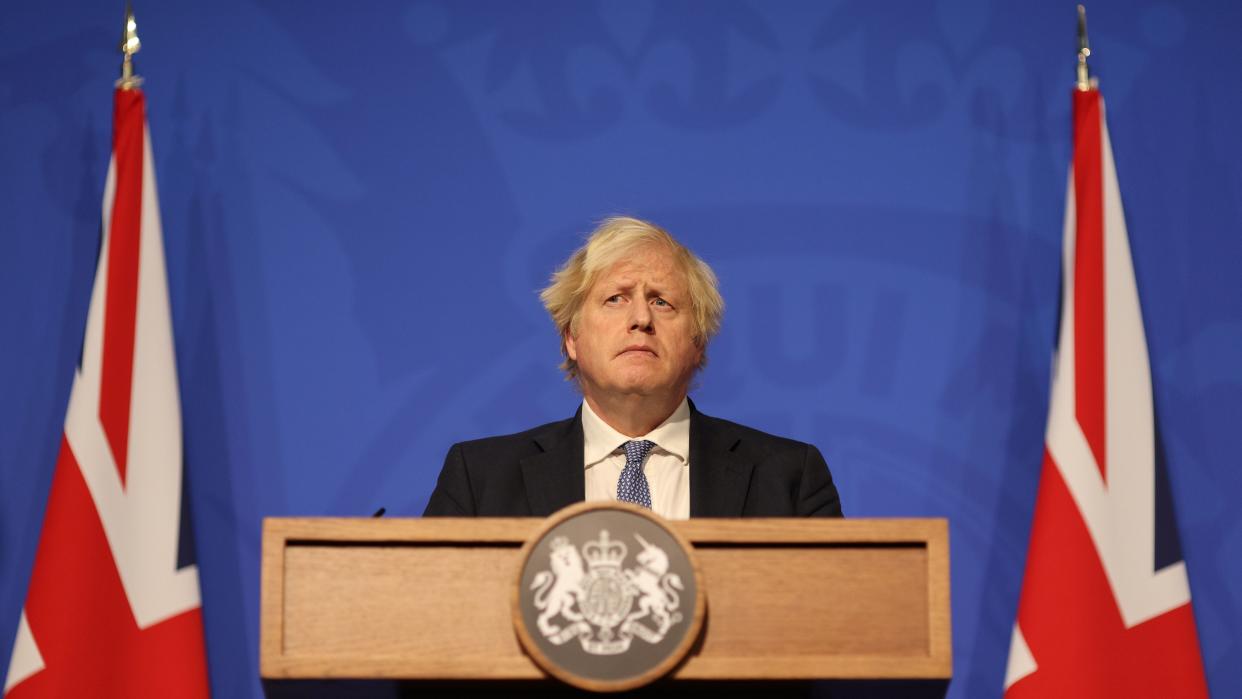U.K. Prime Minister Boris Johnson mandates masks, urges remote work amid omicron surge: ‘I know this will be hard’
Facing an explosion in cases of the omicron coronavirus variant in Britain, Prime Minister Boris Johnson significantly tightened the country’s health guidelines on Wednesday, mandating masks in indoor spaces and urging adults to work from home.
Johnson made the shift to what he called “plan B” after his country logged more than 560 cases of omicron and its Health Security Agency, which monitors COVID in the U.K., determined that cases of the strain could be doubling every two-to-three days.
“While the picture may get better, and I sincerely hope that it will, we know that the remorseless logic of exponential growth could lead to a big rise in hospitalizations and therefore, sadly, in deaths,” Johnson said in a news conference on Wednesday evening.
He said the spread of the heavily mutated variant in Britain now mirrors the growth in cases experienced in South Africa, which has faced an intense spike in recent weeks and is now suffering through a rise in hospitalizations.
He called the new measures “proportionate” and “responsible” given the elevated risk. He said exceptions to the mask mandate would be made for exercise, and that proof of vaccination would be required for entry to crowded places and large venues.
Britain has high vaccination rates — about 70% of the population is fully immunized — and has often resisted lockdowns and masking measures during the pandemic.
We are seeing growth in Omicron cases in the UK that mirrors the rapid increases seen in South Africa.
That is why it is now the proportionate and responsible thing to move to Plan B in England, to slow the spread of the virus.
Find out more: https://t.co/bZZYbzs59L pic.twitter.com/ulvovWoL41— Boris Johnson (@BorisJohnson) December 8, 2021
But omicron, which carries a constellation of mutations that has spooked scientists since its discovery in the southern African country of Botswana, appears more vaccine-resistant than previous incarnations of COVID.
Pfizer and BioNTech said in a statement on Wednesday that two doses of their vaccine “may not be sufficient to protect against infection” from omicron. But the companies said early data suggests that a booster shot of the vaccine prompts a 25-fold increase in antibody protection against the strain.
Britain, like the U.S., has rushed to get booster shots into arms after omicron was first identified by South African scientists on Nov. 25.
The U.K. said on Nov. 29 that it would allow all adults to get extra jabs. In the U.S., the Centers for Disease Control and Prevention modified its booster advice that day, saying in a statement that all adult Americans “should” get an additional shot.
But American leaders have shied away from thrusting mask requirements back upon the country.
In New York City, top city health officials issued a strengthened masking recommendation last week. But Mayor de Blasio has stopped short of mandating face coverings, despite scattered calls.
Gov. Hochul has shown little interest in mask mandates, too. Her office said on Wednesday that 20 cases of omicron had now cropped up across the state. The strain was first spotted in New York last Thursday.

Johnson, who was criticized for moving too slowly to institute lockdowns at the start of the pandemic and experienced a severe COVID case in April 2020, said the “single biggest” precaution Britons can take in response to the omicron scare is to “get our jabs.”
He outlined the nation’s new rules on the one-year anniversary of Britain’s vaccine rollout launch, a global first. After 12 months, the world has distributed billions of the shots, but remains in the grip of a virus that has killed more than 5 million people.
Some early data has suggested omicron may cause less severe symptoms than previous variants, but the picture is blurry. South Africa has a relatively young population, and surges in hospitalizations and deaths lag behind spikes in cases.
Johnson told his country: “We can’t yet assume that omicron is less severe.”
“I know this will be hard for many people,” he said as he announced another round of burdensome restrictions. “But by reducing your contacts in the workplace, you will help slow transmission.”
